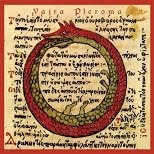Vajra - Pleroma

CD Info
2012
Self Released / United States
10 Tracks
English Lyrics
Giving rock or metal music an ethnic twist isn’t a new idea. Myriad female-fronted metal bands from Epica to Lacuna Coil have added Middle Eastern or oriental elements to their songs, while Sebnem Ferah of Turkey and Dendura of the United States embraced the full-fledged union of both musical worlds. Now we can now add Vajra to the latter category. This band from New York City was founded by singer/ songwriter / multi-instrumentalist Annamaria Pinna during (in Pinna’s exact words) a "self-imposed exile" in India. That trip inspired Pleroma, a fusion of Indian music and progressive rock that has garnered critical acclaim, extensive college radio airplay, and licensing deals with major U.S. cable television channels. Clearly this record has built a storm of excitement since its release in June. I understand why – because Pleroma has left me spellbound, too.
Pleroma is an exploration of contrasts: the darkness of progressive rock with the allure of Indian music. You’ll hear Pinna’s warm, sultry voice accompanied by percussion, chimes, and sitars above keyboard undercurrents and the roar of guitars, drums, and bass. What sets Vajra apart from similar acts, though, is their emphasis on the ethnic elements. It’s as though Pinna focused on the Indian-inspired rhythms and melodies first and then wove in the rock influences. As a result, the rock band takes on unexpected roles in Pleroma. Will Dahl’s guitars, for example, deliver more atmosphere than riffs. They act as everything from a bed to dream upon, to desert winds kicking up a sandstorm, to that index finger beckoning you to come closer. Pinna’s lyrics are also a key aspect of Vajra. The diction and subject matter (mostly spirituality and introspection) fits the music’s zen like a sword in its sheath. It’s breathtaking and understood only when you listen to Vajra yourself.
Despite Vajra’s style constraints, the moods expressed and the instruments highlighted on each song on Pleroma range widely. Imposing with the gong-like ring of synths ("Intuition"), delicate and somber with bell and cymbal nuances ("3.14"), or searing and urgent with swarming arrangements ("Blind") – the amount of variety on Pleroma will take you by surprise. Pinna also understands the impact of melody and the chorus, and employs that understanding throughout the album. Her refrain on "Blind" adds a flare of anger to her message of living with spiritual awareness, maybe because few of us do that. And on "3.14," Pinna’s repeated cry of "It’s never gonna end / I’ve got to let this go" uplifts and haunts the listener all at once. "Almost One," "Erode The Will," and "See Through You" are also great examples of Vajra’s mix of Eastern and Western aesthetics.
The two most progressive numbers on Pleroma have the strongest Indian influences. "The Apple" slithers through snappy percussion and the hovering incense of guitars, and makes you lose track of time until the song ends 8 minutes later. Its crisp, mellow cadence has a danceable beat that reminds me of traditional Indian dancers in brightly colored saris. And then if you rewind back to the opening track, there’s the evocative "Inside The Flame." This incantation epitomizes Vajra’s sound with smoldering arrangements, chanted refrains, and layered rhythms. The lyrics hint at the seduction and danger of the enigmatic: "Pray for your existence / Keep your distance / Meet you inside that flame." It’s as though Pinna’s inviting you to fully experience Pleroma while warning you of its enchantment.
Personally, I’ve enjoyed Pleroma so much because it’s not a conventional rock record. However, considering our readers’ range of tastes, Pleroma may not appeal to everyone. Fans of ethnic, vocal-oriented, and gothic music will appreciate its maturity and its range of atmospheres. Rockers or metalheads who prefer loads of riffing and chugging, on the other hand, may be bored by the composure of Pleroma. As for critiques, the only one I have is on the instrumentals. "India" and "Akkord Pleromy" are both short and ambient, and match Vajra’s overall concept. However, they seem to float between the tracks they bridge without adding much to the final product. Some listeners may like the relaxing nature of both tracks – but in my opinion, they’re like unnecessary pauses that wouldn’t be missed had they been omitted from the album.
I have to admit that writing this review of Pleroma has been a challenge. I feel inept at describing the album because I have little knowledge of traditional Indian music. Then again, I don’t need that knowledge to realize that Pleroma is a snakecharmer. Vajra have executed their mission of blending rock and Indian music with passion and incredible attentiveness. Pinna deserves most of the credit, especially for her engaging vocals, but you can’t ignore the talent of her fellow band members. And although Vajra’s music won’t interest everyone, the band’s mindfulness of the essentials of songwriting gives them the potential to reach a universal audience. They’re already well on their way, thanks to TV and radio opportunities. So, if you’d like to lose yourself in rock-induced hypnosis, let Pleroma be your invitation.
9 / 10
Best Songs: "Inside The Flame," "Blind," "3.14"
Highly recommended for fans of progressive rock/metal (Tool, A Perfect Circle), atmospheric rock/metal (The Gathering, Autumn), ethnic / oriental rock or metal (Sebnem Ferah, Dendura), or female-fronted bands with ethereal or sensual vocals (Lacuna Coil, Flowing Tears)
Pleroma is available for purchase at iTunes, Amazon, and Vajra’s BandCamp page.
